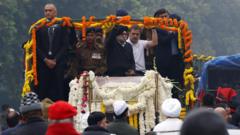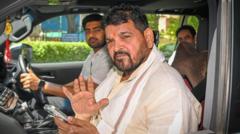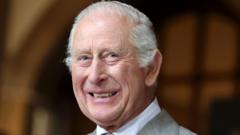Former Prime Minister Manmohan Singh, whose policies sparked economic growth and reform in India, was laid to rest with full state honors in Delhi, drawing tributes from national and international dignitaries.
India Bids Farewell to Economic Architect Manmohan Singh

India Bids Farewell to Economic Architect Manmohan Singh
Nation mourns ex-PM with full state funeral in recognition of his transformative leadership.
India has come together in mourning the passing of its former Prime Minister Manmohan Singh, who passed away at the age of 92. His state funeral, which took place in the capital city of Delhi, reflected the profound impact he had on India during his time in office from 2004 to 2014. Singh was widely regarded as the architect of India's economic liberalization, a period that witnessed significant growth and modernization in the country’s economy.
During the moving ceremony, current Prime Minister Narendra Modi paid tribute to Singh, recognizing him as one of the nation's “most distinguished leaders.” The funeral procession saw thousands of mourners gathering in Delhi to pay their respects as Singh's coffin, adorned with garlands and draped in the Indian flag, was carried through the streets flanked by a military honor guard.
In a poignant moment, Singh's eldest daughter lit his funeral pyre in the presence of top officials, including President Droupadi Murmu, Vice-President Jagdeep Dhankhar, and members of Singh’s Congress Party. The ceremony was attended by numerous foreign dignitaries including Bhutan's King Jigme Khesar Namgyel Wangchuck and Mauritius’ Foreign Minister Dhananjay Ramful. The state honors included a solemn 21-gun salute.
Following Singh's death on Thursday, the Indian government announced seven days of national mourning. Reflecting on their interactions, Modi highlighted Singh’s wisdom and compassion in governance, while Rahul Gandhi, leader of the opposition Congress Party, described him as a mentor and guide.
International tributes also poured in, with US President Joe Biden praising Singh’s strategic vision, stating that the enhanced US-India relations were largely due to his diplomatic efforts. Biden referred to Singh as a dedicated public servant and an exemplary human being.
Having transformed India’s economic landscape since he served as Finance Minister in 1991, Singh's leadership is recognized for lifting millions out of poverty and propelling India into a position as one of the fastest-growing economies globally. Singh was the first Sikh to hold India’s premiership and is remembered for his humility and for making a formal apology in 2005 regarding the tragic 1984 anti-Sikh riots.
Though celebrated for his contributions, Singh’s later years in office were marred by corruption allegations, which some believe contributed to his party's significant loss in the 2014 elections. His legacy, however, remains one of significant national growth and a pivotal shift in India's economic policies.



















